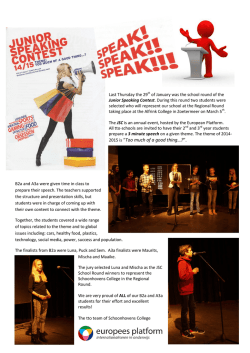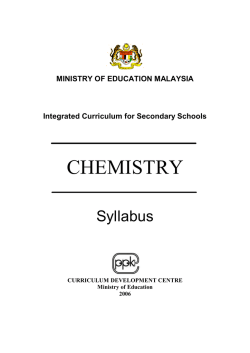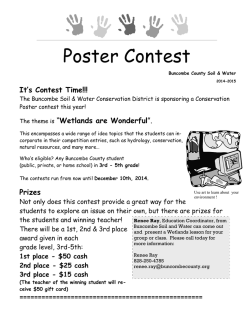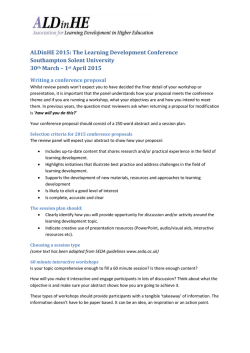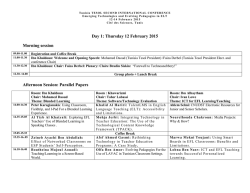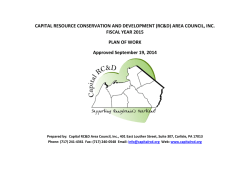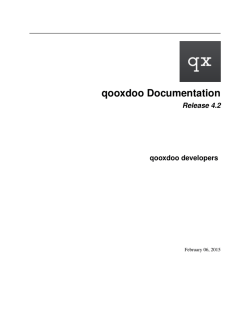
SCIENCE
MINISTRY OF EDUCATION MALAYSIA Integrated Curriculum for Secondary Schools SCIENCE Syllabus CURRICULUM DEVELOPMENT CENTRE 2003 THE NATIONAL PHILOSOPHY Our nation, Malaysia, is dedicated to achieving a greater unity of all her peoples; to maintaining a democratic way of life; to creating a just society in which the wealth of the nation shall be equitably shared; to ensuring a liberal approach to her rich and diverse cultural traditions; to building a progressive society which shall be oriented toward modern science and technology; We, her peoples, pledge our united efforts to attain these ends guided by the following principles: BELIEF IN GOD LOYALTY TO KING AND COUNTRY SUPREMACY OF THE CONSTITUTION RULE OF LAW GOOD BEHAVIOUR AND MORALITY NATIONAL PHILOSOPHY OF EDUCATION Education in Malaysia is an on-going effort towards further developing the potential of individuals in a holistic and integrated manner, so as to produce individuals who are intellectually, spiritually, emotionally and physically balanced and harmonious based on a firm belief in and devotion to God. Such an effort is designed to produce Malaysian citizens who are knowledgeable and competent, who possess high moral standards and who are responsible and capable of achieving a high level of personal wellbeing as well as being able to contribute to the betterment of the family, society and the nation at large. NATIONAL SCIENCE EDUCATION PHILOSOPHY In consonance with the National Education Philosophy, science education in Malaysia nurtures a Science and Technology Culture by focusing on the development of individuals who are competitive, dynamic, robust and resilient and able to master scientific knowledge and technological competency. PREFACE Science and technology plays a crucial role in meeting Malaysia’s aspiration to become a developed nation. Therefore, the provision of quality science education from an early age in the education process is of paramount importance. The syllabus as outlined in this document has been designed to provide opportunities for students to acquire scientific knowledge and skills. It also seeks to inculcate noble values and love for the nation towards developing a future generation which is capable of contributing to the harmony and prosperity of the nation and its people. The curriculum aims at producing active learners. The pupils are given ample opportunities to observe, ask questions, formulate and test hypotheses, analyse, interprete data, report and evaluate findings. Throughout the investigative learning process, the pupils will be encouraged to apply science process skills, thinking skills and thinking strategies for thoughtful learning. The teaching of Science using English as the medium of instruction enables pupils to obtain various sources of information written in English either in electronic or print forms and helps them to keep abreast of developments in science and technology. Pupils will be able to see science and technology in a wider context and learn to relate their knowledge to the world beyond their school. This syllabus is the work of many individuals and experts in the field. On behalf of the Ministry of Education, I would like to express my deepest appreciation to those who have given their vital support and contributed in one way or another on this effort. (MAHZAN BIN BAKAR SMP, AMP) Director Curriculum Development Centre Ministry of Education, Malaysia Science Syllabus INTRODUCTION As articulated in the National Education Policy, education in Malaysia is an on-going effort towards further developing the potential of individuals in a holistic and integrated manner to produce individuals who are intellectually, spiritually, emotionally, and physically balanced and harmonious. The primary and secondary school science curriculum is developed with the aim of producing such individuals. As a nation that is progressing towards a developed nation status, Malaysia needs to create a society that is scientifically oriented, progressive, knowledgeable, having a high capacity for change, forward looking, innovative and a contributor to scientific and technological developments in the future. This society should also have the capability to manage the environment and its resources in a responsible manner. In line with this, there is a need to produce citizens who are creative, critical, inquisitive, open-minded and competent in science and technology. Science is a discipline comprising knowledge, skills, and scientific attitudes and noble values. The integration of these three elements is very important in ensuring a quality of science education. As a discipline of knowledge, science provides a conceptual framework that enables students to understand the world around them. Science is also a process that emphasises inquiry and problem solving. Thus, science develops skills in investigating the environment, which involves thinking skills, thinking strategies and scientific skills. Knowledge is therefore acquired as the product of an investigation. Scientific inquiry also requires and enables students to develop scientific attitudes and noble values. The science curriculum for the Integrated Curriculum for Primary School and the Integrated Curriculum for Secondary School are designed for students from primary to secondary schools. The curriculum is formulated based on the needs of the nation as well as global scientific requirements. The focus is directed towards thoughtful learning and optimising the learning. The science curriculum comprises three core science subjects and four elective science subjects. The core subjects are Science at primary school level, Science at lower secondary level and Science at upper secondary level. Elective science subjects are offered at the upper secondary level and consist of Biology, Chemistry, Physics, and Additional Science. The core science subjects for the primary and lower secondary levels are designed to provide students with basic science knowledge, prepare students to be literate in science, and enable students to continue their science education at the upper secondary level. Core Science at the upper secondary level is designed to produce students who are literate in science, innovative, and able to apply scientific knowledge in decision-making and problem solving in everyday life. The elective science subjects prepare students who are more 1 Science Syllabus scientifically inclined to pursue the study of science at post-secondary level. This group of students would take up careers in the field of science and technology and play a leading role in the field for national development. For every science subject, the curriculum for the year is articulated in two documents: the syllabus and the curriculum specifications. The syllabus presents the aims, objectives and the outline of the curriculum content for a period of two years for elective science subjects and five years for core science subjects. The curriculum specifications provide the details of the curriculum, which includes the learning objectives, suggested learning activities, the intended learning outcomes, and vocabulary. AIMS The aims of the science curriculum for secondary schools are to provide students with the knowledge and skills in science and technology and enable them to solve problems and make decisions in everyday life based on scientific attitudes and noble values. Students who have followed the secondary science curriculum will have a basic foundation in science to enable them to pursue formal and informal further education in science and technology. The curriculum also aims to develop a concerned, dynamic and progressive society with a science and technology culture that values nature and works towards the preservation and conservation of the environment. OBJECTIVES The science curriculum for secondary school enables students to: 1. Acquire knowledge in science and technology in the context of natural phenomena and everyday life experiences. 2. Understand developments in the field of science and technology. 3. Acquire scientific and thinking skills. 4. Apply knowledge and skills in a creative and critical manner to solve problems and make decisions. 5. Face challenges in the scientific and technological world and be willing to contribute towards the development of science and technology. 6. Evaluate science and technology-related information wisely and effectively. 7. Practise and internalise scientific attitudes and good moral values. 2 Science Syllabus 8. Realise the importance of inter-dependence among living things and the management of nature for the survival of mankind. 9. Appreciate the contributions of science and technology towards national development and the well-being of mankind. 10. Realise that scientific discoveries are the result of human endeavour to the best of his or her intellectual and mental capabilities to understand natural phenomena for the betterment of mankind. 11. Create awareness on the need to love and care for the environment and play an active role in its preservation and conservation. CONTENT ORGANISATION The science curriculum is organised around themes. Each theme consists of various learning areas, each of which consists of a number of learning objectives. A learning objective has one or more learning outcomes. Learning outcomes are written based on the hierarchy of the cognitive and affective domains. Levels in the cognitive domain are: knowledge, understanding, application, analysis, synthesis and evaluation. Levels in the affective domain are: to be aware of, to be in awe, to be appreciative, to be thankful, to love, to practise, and to internalise. Where possible, learning outcomes relating to the affective domain are explicitly stated. The inculcation of scientific attitudes and noble values should be integrated into every learning activity. This ensures a more spontaneous and natural inculcation of attitudes and values. Learning outcomes in the psychomotor domain are achieved implicitly through the learning activities. The Suggested Learning Activities in the supporting document entitled ‘Curriculum Specifications’provides information on the scope and dimension of learning outcomes. The suggested learning activities aim at providing some guidance as to how learning outcomes can be achieved. A suggested activity may cover one or more learning outcomes. At the same time, more than one activity may be suggested for a particular learning outcome. Teachers may modify the suggested activities to suit the ability and style of learning of their students. At the same time, teachers are encouraged to design other innovative and effective learning activities to enhance the learning of science. Teaching and learning strategies in the science curriculum emphasise thoughtful learning. Thoughtful learning is a process that helps students acquire knowledge and master skills that will help them develop their mind to an optimum level. Thoughtful learning can occur through various learning approaches such as inquiry, constructivism, contextual learning, and mastery learning. These learning approaches encompass learning methods such as experiments, discussions, simulations, projects, visits and future studies. Learning activities should therefore be geared towards activating students’ critical and creative thinking skills and not be confined to routine or rote learning. 3 Science Syllabus Students should be made aware of the thinking skills and thinking strategies that they use in their learning. They should be challenged with higher order questions and problems and be required to solve problems utilising their creativity and critical thinking. The teaching and learning process should enable students to acquire knowledge, master skills and develop scientific attitudes and noble values in an integrated manner. The learning of science is not limited to activities carried out in the school compound. The latest trend in science education is to encourage smart partnership between the Ministry of Education and various organisations such as institutions of higher learning, other governmental agencies, nongovernmental agencies and private corporations to provide new ideas, opportunities, strategies and skills. Learning of science can also be enhanced through the use of external resources such as zoos, animal sanctuaries, museums, science centres, research institutes, mangrove swamps, and factories. Visits to these places make the learning of science more interesting, meaningful and effective. To optimise learning opportunities, visits need to be carefully planned. Students may be involved in the planning process and specific educational tasks should be assigned during the visit. No educational visit is complete without a post-visit discussion. The skills to select, analyse and evaluate information from various sources are also developed. Through the use of technology such as television, radio, video, computer, and Internet, the teaching and learning of science can be made more interesting and effective. Computer simulation and animation are effective tools for the teaching and learning of abstract or difficult science concepts. Computer simulation and animation can be presented through courseware or Web page. The use of technology will enhance the effectiveness of teaching and learning of science besides optimising the intended learning outcomes. SCIENTIFIC SKILLS Scientific skills encompass science process skills and manipulative skills. Science process skills promote thinking in a critical, creative, analytical and systematic manner. The mastering of science process skills together with scientific attitudes and knowledge will enable the students to think, formulate questions and find out answers systematically. Science Process Skills Science process skills that need to be developed in the science curriculum are as follows: ? ? ? ? ? ? Observing Classifying Measuring and Using Numbers Inferring Predicting Communicating 4 Science Syllabus ? ? ? ? ? ? Using Space-Time Relationship Interpreting Data Defining Operationally Controlling Variables Hypothesising Experimenting. Manipulative Skills Manipulative skills are psychomotor skills in scientific investigation which enable students to: ? ? ? ? ? Use and handle science apparatus and laboratory substances correctly, Store science apparatus correctly and safely, Clean science apparatus correctly, Handle specimens correctly and carefully, Observe, record and measure accurately. Thinking Skills Teaching and learning of science provides a good opportunity to develop students’thinking skills. Strategies in teaching and learning science require the mastering of thinking skills and thinking strategies which will be the foundation for thoughtful learning. Thinking strategies can be categorised into critical thinking skills and creative thinking skills. Scientific Attitudes and Noble Values Science learning experiences can be used as a means to inculcate positive scientific attitudes and noble values in students. The inculcation of scientific attitudes and noble values can be done spontaneously or through planned activities. In this curriculum, the learning objectives for the affective domain are articulated as specific learning outcomes. The specific activities to achieve the learning objectives have also been suggested. Knowledge Content The curriculum content is organised around the following themes: A. B. C. D. E. Introducing Science Man and the Variety of Living Things Matter in Nature Maintenance and Continuity of Life Force and Motion 5 Science Syllabus F. G. H. I. Energy in Life Balance and Management of the Environment Technological and Industrial Development in Society Astronomy and the Exploration of Outer Space. The following are the learning areas and content of each theme: A. Introducing Science This theme introduces students to the meaning of science and technology where science is a body of knowledge and technology is the application of science knowledge. Students are also introduced to the method of acquiring science knowledge in a scientific manner through scientific investigations. Students are trained to conduct investigations systematically in order to understand natural phenomena and to test its truth and validity. The theme also discusses physical quantities and measurement in which students are exposed to the principles of measuring instruments and the use of International System Unit (SI). The contents of this theme are as follows: A. Introducing Science 1. Introduction to Science ? Understanding Science ? Introduction to Scientific Investigation ? Physical Quantities and Measurement 2. Scientific Investigation ? Method of Scientific Investigation ? Scientific Attitudes and Noble Values B. Man and the Variety of Living Things This theme aims to provide understanding of cells as a basic unit of life, biological diversity, classification of living things, and the benefits and effects of microorganisms on health. The theme also focuses on human beings to enable students to understand themselves as a biological entity. The contents of this theme are as follows: 1. Cell as a Unit of Life ? ? ? Cell Unicellular and Multicellular Organisms Human Cell 6 Science Syllabus 2. Variety of Living Things and their Classification ? ? ? ? ? ? Biodiversity Interdependence among Living Organisms and the Environment Classification of Animals Classification of Plants The System of Classification of Living Things The Role of Human Being in the Universe 3. Microorganisms and their Effects on Life ? ? ? ? ? ? Classification of Microorganisms Factors affecting the activities of Microorganisms The Role of Useful Microorganisms in Everyday Life Harmful Microorganisms Prevention of Infectious Diseases Methods of Treating Diseases C. Matter in Nature This theme aims to provide understanding of the variety of resources on Earth and their importance in supporting life. The theme also includes the study about matter, and the structure and characteristics of various materials. Students learn to understand how various materials are produced from the Earth’s natural resources by using technology. Environmental issues and the depletion of natural fuel are highlighted to create an awareness among students that human being has the responsibility to manage the environment wisely and in a sustainable way. The contents of this theme are as follows: 1. Matter ? ? ? ? State of matter Effect of heat on matter Density and Buoyancy Principles of Expansion and Contraction 2. Variety of Resources on Earth ? ? Earth’s Resources Elements, Compounds and Mixtures in the Earth’s Resources. 3. The Air Around Us ? ? ? Composition of Air Properties and Uses of Oxygen and Carbon Dioxide Oxygen for Respiration 7 Science Syllabus ? ? ? ? ? Rusting Combustion Carbon Dioxide for Photosynthesis Air Pressure Air Pollution 4. Water and Solution ? ? ? ? ? ? ? ? ? ? ? Physical Properties of Water Composition of Water Evaporation of Water Water Cycle Solution and Solubility Non-aqueous Solvent Acid and Alkali Neutralisation Water Purification Water Supply System Conservation and Preservation of Quality of Water 5. Land and Its Resources ? ? ? ? ? ? Minerals in the Earth’s Crust Reaction of Metals and Non-metals Silicon Compounds Calcium Compounds Natural Fuel Resources Conservation and Preservation of Natural Fuel Resources and Their Importance 6. Matter and Substance ? ? ? ? ? ? ? Changes in the State of Matter Structure of an Atom Proton Number and Nucleon Number Classification of Elements in the Periodic Table Properties of Substances Metals and Non-Metals Methods of Purifying Substances 7. Carbon Compound ? ? ? ? ? ? Variety of Carbon Compounds on Earth Alcohol and Its Effect on Health Fats and Its Effect on Health Palm Oil and Its Importance Soap and Its Cleaning Action Natural Polymers 8 Science Syllabus D. Maintenance and Continuity of Life This theme aims to provide understanding of life processes that ensure continuity of life and the importance of senses to human beings and other living things to enable them to detect changes in the environment. The theme also shows how the nervous system and the endocrine system are coordinated in the human body. Students also learn about heredity and variation among human beings and other living things. The contents of this theme are as follows: 1. The World Through Our Senses ? ? ? ? ? ? ? ? ? Sensory Organs and Its Functions Sense of Touch Sense of Smell Sense of Taste Sense of Hearing and Balance Sense of Sight Light and Sight Sound and Hearing Stimulus and Response in Plants 2. Nutrition ? ? ? ? ? ? Classes of Food Balanced Diet Human Digestive System Absorption and Transportation of Digestive Products Defecation Healthy Eating Habits 3. Blood Circulation and Transportation ? ? ? Human Blood Circulatory System Human Blood Transport System in Plants 4. Respiration ? ? ? Breathing Mechanism in Human Beings Transportation of Oxygen in the Human Body Caring for the Health of the Respiratory System 9 Science Syllabus 5. Excretion ? ? ? Excretion in Human Beings Human Kidney Excretion in Plants 6. Reproduction ? ? ? ? ? ? ? ? ? ? Sexual and Asexual Reproduction Human Reproductive Systems Fertilisation and Pregnancy in Human Beings Nutrition during Pregnancy Research in Human Reproduction Sexual Reproduction in Flowering Plants Pollination Dispersal and Germination of Seed Vegetative Reproduction in Flowering Plants Reproduction of Non-flowering Plants 7. Growth ? ? ? Growth in Human Beings Growth in Plants Life Cycle of Animal and Its Importance 8. Body Coordination ? ? ? ? ? ? ? ? Understanding Body Coordination Human Nervous System Nervous Coordination Human Brain and Its Complexity Hormonal Coordination Coordination between the Nervous System and the Endocrine System Effects of Drug Abuse on Body Coordination and Health Effects of Excessive Consumption of Alcohol on Body Coordination and Health 9. Heredity and Variation ? ? ? ? ? ? Cell Division Principles and Mechanism of Inheritance Sex Determination and Occurance of Twins in Human Beings Mutation Effects of Genetic Research on Human Life Variation among Living Things 10 Science Syllabus 10. Nutrition and Production of Food ? ? ? Nutrition and Balanced Diet Plant Nutrition Nitrogen Cycle E. Force and Motion This theme aims to provide an introduction to the study of the basic principles of force and motion on land, in water and in air. The theme also provides an understanding of the support system and movement in human beings and in living things. The contents of this theme are as follows: 1. Dynamics ? ? ? Force and Measurement Frictional Force Work and Power 2. Support and Movement ? ? ? Support in Human Beings, Animals, and Plants Movement of Limbs in Human Beings Support and Movement in Vertebrates and Invertebrates 3. Motion ? ? ? ? ? ? ? ? Mass and Inertia Motion of Vehicles on Land Speed, Velocity and Acceleration Momentum, Pressure Pressure in the Hydraulic System Motion of Vehicles in Water Motion of Vehicles in Air F. Energy in Life This theme aims to provide understanding of various forms of energy, its conservation and its importance in life. The theme also covers issues such as depletion of energy, renewable and alternative energy. The roles of light and colour in life and the contribution of optical instruments in enhancing the ability of human senses are also highlighted. 11 Science Syllabus The contents of this theme are as follows: 1. Sources and Forms of Energy ? ? ? ? Various Sources of Energy Depleted Sources of Energy Alternative and Renewable Energy Conservation of Energy 2. Heat and the Transfer of Heat ? ? ? ? Methods and Application of Heat Transfer Absorption and Emission of Radiant Heat Heat and Temperature Heat Control in Living Things and Human Beings 3. Electricity ? ? ? ? ? ? Electrostatic Electric Current Measurement of the Quantity of Electricity Current, Voltage and Resistance Electric Circuit Conservation of Electricity 4. Magnetism and Electromagnetism ? ? Magnetism and Electromagnet Direct and Alternating Current 5. Generation and Supply of Electricity ? ? ? ? ? ? ? ? Generation of Electrical Supply Transformer Transmission and Distribution of Electrical Energy Electrical Supply and Wiring System Cost of Electrical Energy Fuse and Earth Wire Safety Measures in the use of Electricity Conservation of Energy 6. Nuclear Energy ? ? ? Radioactive Substances and their Uses Production of Nuclear Energy and Its Uses Proper Handling of Radioactive Substances 12 Science Syllabus 7. Energy and Chemical Changes ? ? ? ? ? ? Chemical Changes and Physical Changes Heat Change in Chemical Reactions Reactivity Series of Metals and Its Applications Electrolysis Production of Electrical Energy from Chemical Reactions Chemical Reactions that Occur in the Presence of Light 8. Light, Colour and Sight ? ? ? ? ? ? ? Image Formation by Plane Mirrors and Lenses Image Formation by Optical Instruments Light Dispersion Light Scattering Principles of Addition and Subtraction of Coloured Lights Pigments Importance of Colour G. Balance and Management of the Environment This theme aims to provide understanding on the balance of nature and the interdependence among living things and the environment, the natural cycles in nature and the effects of unsystematic management of the environment. The theme also develops awareness that human beings play an important role in the conservation and preservation of nature and has the responsibility to manage nature wisely. The contents of this theme are as follows: 1. Biodiversity ? Variety of Living Things and their Classification 2. Interdependence among Living Things and the Environment ? ? ? ? ? Interdependence among living things and the Environment Adaptation of Living Things Interaction between Living Things Food Web and Pyramid Number Role of Human Beings in Maintaining the Balance of Nature 3. Preservation and Conservation of the Environment ? ? The Balance of Nature Effects of Pollution on the Environment 13 Science Syllabus ? ? ? H. Pollution Control through Conservation and Preservation of the environment The Importance of Managing Natural Resources Preservation and Conservation of the Environment through Good Management and Planning Technological and Industrial Development in Society This theme aims to provide understanding on the development of industrial technology in society. The theme encompasses understanding of machines and stability of objects, electronic equipment and the use of technology to produce various materials from the Earth’s resources. Emphasis is given to the contribution of the electronic field in the enhancement of communication. Issues such as industrial waste disposal and its effect on the environment is also highlighted. The contents of this theme are as follows: 1. Strength and Stability ? ? Stability of Object Stability of Structure 2. Machine ? ? Levers Invention of Machines 3. Electronics ? ? Electronic Equipment Innovation in the Electronic Field 4. Chemicals in Industry ? ? ? Properties of Alloys and their Uses in Industry Production of Ammonia and Its Uses in Industry Effects of Industrial Waste Disposal on the Environment 5. Food Production and Food Technology ? ? Developments in Food Technology Increase in National Food Production 6. Synthetic Materials in Industry ? ? Synthetic Polymers Plastics 14 Science Syllabus 7. Electronic and Information and Communication Technology ? ? ? Radio Waves Radio Communication System Development in Information and Communication Technology I. Astronomy and Outer Space Exploration This theme aims to provide understanding of the Universe, the relationship between the Earth and the Moon encompassing phenomena such as eclipse, and the occurence of day and night. The theme also provides awareness that order exists in nature and the need for human beings to continue with the endeavour to further expand our knowledge on nature. The contents of this theme are as follows: 1. Astronomy ? ? ? ? ? Planets in the Solar System Meteoroids, Asteroids and Comets in the Solar System Natural Phenomena due to the movement of the Earth and the Moon The Sun Stars and the Galaxies in the Universe 2. Outer Space Science ? ? ? Developments in the Field of Astronomy and Outer Space Exploration Importance of Space Technology Efforts in Outer Space Exploration 15 Curriculum Development Centre Minikstry of Education 2003
© Copyright 2026

